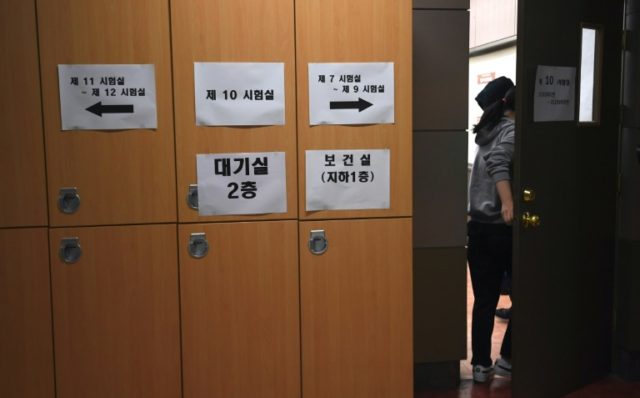Busan (South Korea) (AFP) – A young filmmaker has turned the camera on her own family to document South Korea’s obsession with education and the severe toll it takes on its children — including her sister — in the ultra-competitive society.
Koo Yun-joo’s documentary “Dear My Genius”, which premiered at the Busan International Film Festival on Saturday, follows the director’s seven-year-old sister and mother — who has plans to turn the little girl into a so-called gifted child.
Many education authorities and colleges in South Korea regularly test children on their ability in maths, science and other key subjects and award those who excel with “gifted child” certificates — considered a big plus in future university applications.
Young South Koreans devote most of their childhood and teenage years to studying — which involves lots of rote-learning — to earn a place in one of the elite universities seen as key to future careers and marriage prospects.
The South’s education system is often held up by other countries as a model of rigorous meritocracy, but the pressure to score well has been blamed for teenage depression and suicide rates that are among the highest in the world.
The documentary offers a rare glimpse into a real-life family dynamic common in South Korean households, and the cut-throat competition facing the country’s children likened by some to systematic child abuse.
To reach child prodigy status, Koo’s sister Yun-yung spends hours after school at “hagwons” — private cram schools — to study subjects including maths, English, Chinese, computer and essay writing.
Her mother keeps a detailed list of all the books the first-grader has read since the age of five, and borrows from a local library 26 books every fortnight — the bimonthly limit — aiming to make her read thousands of books each year.
“I feel a sense of achievement looking at this,” the mother says proudly as she updates the list with titles ranging from self-improvement books for children to biographies of prominent figures.
– Tears and tantrums –
Stressed out while solving complex maths problems or memorising English words late into the night, Yun-yung often bursts into tears, throws tantrums and develops sudden headaches, while her mother either cajoles or berates her to make her keep going.
The director, once a “gifted child” in science herself, clashes with her mother over how to raise Yun-yung, saying rote-learning and the blind pursuit of perfect test scores didn’t teach her how to figure out what she really wanted in life.
Yun-yung also repeatedly talks about her dream to “become a gifted child” and to “go to the best university” but she is lost for words when asked why she wants this.
“I could see my mom was trying to raise Yun-yung like she did me and my sister being crushed under pressure and changing into an angry, harsh kid…I wanted to do something for her as well as mum,” Koo told AFP.
“Mum was also eager to change…but it’s easier said than done if you live in this environment where all other parents and their children are racing full-speed to get ahead,” said the 26-year-old.
A slogan inscribed in the playground of Yun-yung’s elementary school reads “Only those who endure pain can smile”, while most residential neighborhoods are packed with countless hagwons promising parents to make their children “more special than others”.
Another of Koo’s sisters — an elementary school teacher — says most pupils in her class are even more miserable than Yun-yung due to the pressure to excel, with the top student in her class admitting to suicidal thoughts.
A playground in the Yun-yung’s neighborhood is empty most of the week, with children busy hopping from one hagwon to another after school.
Koo’s family eventually decides to send Yun-yung to fewer cram schools and ease the pressure on her to read — while the mother, a full-time housewife, tries to devote more time to herself.
But tough challenges still lie ahead for the South’s conformist society.
One animation featured in the movie shows a group of figures with different shapes and colors on a moving conveyor belt, before they are squeezed and remolded into identical-looking figures with a “first-class 1” sign stamped on their chest.
“I just wanted to make people take a step back and see what our children are missing — including abilities to have fun, play with others, or quietly reflect upon themselves — in this blind pursuit of academic excellence at all costs,” said Koo.

COMMENTS
Please let us know if you're having issues with commenting.